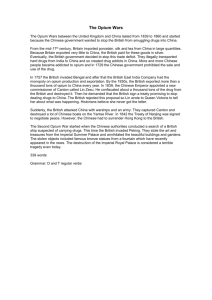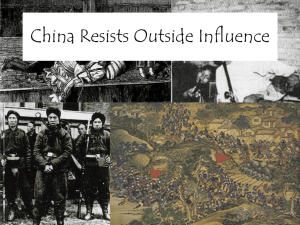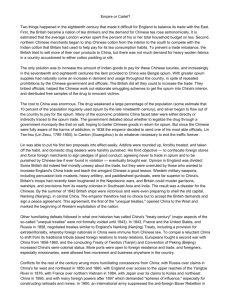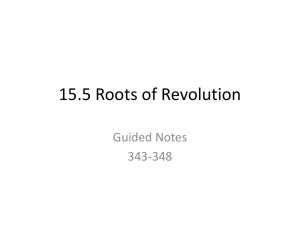Western Intervention in China - NAU jan.ucc.nau.edu web server
advertisement
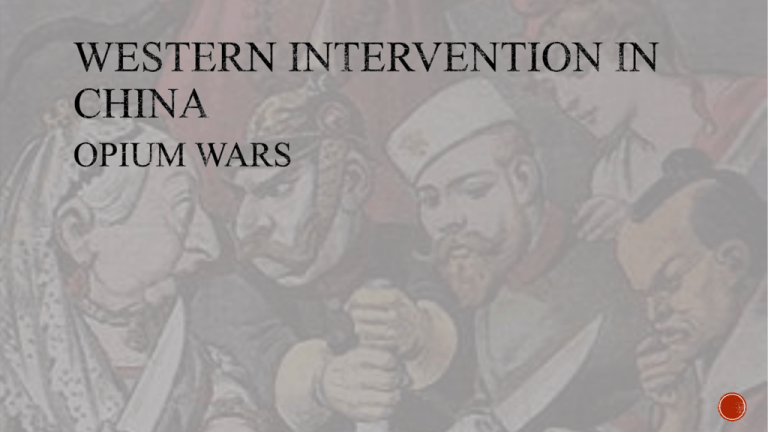
China did not need western goods While they did not mind trade with the outside if it brought in wealth, the Chinese state did not actively pursue trade as source of wealth. In the traditional Confucian hierarchy, trade ranked among lowest of occupations Emperor QIANLONG wrote to George III of England claiming, "we have never valued ingenious articles, nor do we have the slightest need of your country's manufactures. Therefore, O King, as regards your request to send someone to remain at the capital, while it is not in harmony with the regulations of the Celestial Empire we also feel very much that it is of no advantage to your country." West did need Chinese Goods: Initially Silks, then after 1700s, TEA By 1800 the English East Company (same as the one in India) was buying 23 MILLION POUNDS OF TEA WORTH 3.6 MILLION BRITISH POUNDS. Net inflow of wealth for China: 3 million TAEL in 1760s. (a unit of exchange, worth approx. one ounce of silver) rising to 16 million TAEL in 1780s. Need something to balance the trade Found it via OPIUM, a drug that could be grown in poppy farms in areas they controlled in INDIA Bottom line, THIS is the cause of Opium Wars and Imperialism in China, but what is often highlighted is the role of CULTURE Attitudes denigrating the Chinese were common but fairly recent in 19th Century Europe As late as 1740s Volatire, one of the leading figures in the Enlightenment, was all praise for China, and opened his review of world history with a positive assessment of Chinese history. By the 1820s though, Hegel sees it is as a despotic society with no possibility of advancing towards liberty. This is in line with common representation of China as decadent, lacking in justice, equality,etc. Did China change or did Europe? Reasons for change in attitude Economic change: Industrial Revolution Ideas: Enlightenment ideas now widely adopted Political changes: American and Haitian Revolutions, French Revolution, English Reforms In SUM: a new YARDSTICK of measurement, one that is still with us, aka MODERNITY By the third decade of 19thCentury, China measured by this yardstick and found wanting! (keep in mind this is the same yardstick adopted by the ANGLICISTS in India, roughly around the same time, to critique Indian “barbarism”) This allows Western powers to treat Chinese (and Indians) as less than their equals But ECONOMICS remains at the heart of the Imperial Project, whether in India or China WHY? Possibly on account of global shortage of silver after Revolutionary Wars in Latin America Could be grown in India, where peasant compelled (directly and through tax policies) to grow and harvest poppy for opium Shipped in chests, each chest containing 130-160 lb.s and ship to China. Chinese encouraged to smoke it! Start in the second quarter of 1700s, 1720s-30s, but on a small scale Until it was small, Chinese govt not pay much attention, restrict via CO HONG (or Canton) system after 1760 Important to note that it was not only the English, but also American, German, Dutch and even a few Indian merchants were involved in this trade. But the English Hong (business house) were the most influential The CoHong were a guild of merchants in Guangzhao (Canton) who were made responsible for all trade with Western merchants Growth of Opium trade 1729 1790 1835 1838 200 chests 4000 chests 30,000 chests 40,000 chests Leads to a net OUTFLOW of SILVER from China 1820s 2 million tael 1830s 9 million tael ECONOMICALLY Outflow of Silver : By 1804 there was a net OUTFLOW of Silver from China, despite tea trade. By 1809 reach around 10 million silver dollars Not only an impact on Imperial Treasury, but far down the scale too. Administrators have less money for crucial flood control work, e.g. Peasants have to pay higher real taxes because, while taxes calculated in Silver, paid for most part in Copper coin. The shortage of silver meant it cost more copper coins for each silver coin. Thus, REAL taxes increase POLITICALLY (do remember this and all that follows, when reading Ghosh’s novel) Greater corruption, the profits were so attractive and so large that there was incentive to defy the orders of the Imperial Court, thus undermining its authority SOCIALLY By 1838 the number of Chinese opium addicts had grown to between four and twelve million Impact at every level of Chinese society. The first anti-opium edict was promulgated in 1729 Repeated, in more drastic terms by proclamation of 1799 And, again, in 1810, an Imperial Edict, threatening dire punishment for transgressors Finally, around 1838, Commissioner Lin was sent in 1839 LIN ZEXU appointed commissioner (Commissioner LIN) May 1839 Lin arrests, seize 35000 lb.s opium from Chinese merchants This is when he is said to have written directly to Queen Victoria, pleading for her intervention to stop her merchants from trading in this vile substance. Obviously, to no avail. March 24 1839 Lin blockades the “13 Factories” and arrests a prominent British Opium trader Also compels the British Trade Superintendent in Guangzhao (Canton), to surrender 20,000 chests of opium and destroys it CONTEXT 1834: EIC monopoly end, now trade was no longer a merchant affair, but supervised by a direct representative of the British Crown East India Company merchants, and other merchants (European and American) were lobbying hard to continue drug dealing using the ideological cloak of “free trade” Jardine, one of the most prominent opium traders, spends more than 20,000 British pounds lobbying Parliament in support of “free trade” Much of the negative stereotyping of China, its rulers, its barbaric customs etc. is a product of the period where there is the greatest effort of push the “free” trade in illegal drugs WAR In part the result of Jardine’s lobbying, the British send in a force of 16 warships with 540 guns on them, along with expeditionary military forces from India. Came to be known as “Gunboat Diplomacy”! Not deny China’s right to stop trade in illegal substance, but demand compensation for “illegally” seized merchandise! Leads to war; LIN defends Guangzhao (Canton), British ships blockade the port and move up north to threaten other coastal areas Temporary end to hostilities, with Chinese pay a $6million ransom and cede Hong Kong Neither side is happy: In 1841 again hostilities, this time British more thorough, with a larger force, capture Shanghai In 1842, the Chinese are compelled to sign the humiliating Treaty of Nanjing The Peace of Nanjing is the first of many UNEQUAL TREATIES that the Chinese governments are forced to sign It is the start of what came to be called the TREATY PORT system 5 ports including Shanghai and Guangzhou (Canton) were to be completely open to British and later all western settlers A further $21million in damages was awarded to British merchants and to the British state Hong Kong was to be ceded in perpetuity End CoHong system: aka “free trade” without restrictions by the Chinese government In 1843 the United States demands and is granted the same concessions: plus Christian missionaries are to be allowed to work in China EXTRA TERRITORAILITY (that is, the right to judge ones own people) So Chinese laws no longer apply to Westerners in China 1844 France joins the club Emergence of the MOST FAVORED NATION clause into treaties. That is, all get same concessions as others!! Second Opium Wars, Looting and burning of the Emperor’s Summer Palace followed, leading to the even more humiliating Treaty of Tientsin and the Beijing Convention of 1860, bringing the wars to a close By the beginning of the 20th Century there were 92 “treaty ports” some of which were not ports at all but inland towns!! Moreover, had the right to have armed soldiers to guard investments including railways. With such complete loss of real sovereignty China was virtually a colony See in the context of connections between trade, industry, and empire Early colonialism, 17-18 C was driven by mercantilism, trade was prime source of wealth. Territorial control (via taxes) help make greater profits. Divide Asia into their own domains: Britain in India, Dutch in what is today Indonesia. In the 18thC the US is still in formative phase, lots of internal colonialism possible, no need to expand. Germany not a single nation, and Spain and Portugal in decline after early empires. This, 18th C, was time when conquest of China not possible. So fight between Britain and France in India, but the British prevail. By early 19thC, most of Asia already divided But now comes the big change, the INDUSTRIAL REVOLUTION. A completely different quantum of profits to be made through manufacture and industry. Industrialists, rather than traders come to dominate the politics of imperial powers Industry needs not territory but raw materials and MARKETS. There is no need to go to the expenses entailed in the control of alien territories if could get markets with either short wars, or the THREAT of war. War justified through ideology of “free trade” This is what happen to China and Japan in 19th C. But as war has been justified by ideology of free trade, difficult to justify outright conquest Important to keep in mind that by the mid 19thC, the Industrial Revolution has spread to other parts of the world. All major powers now looking for markets. COMPETITION As a result no one power could divide up China as easily in the 19th C as India was taken in the 18th , e.g. the US also interested in China and Japan markets.
